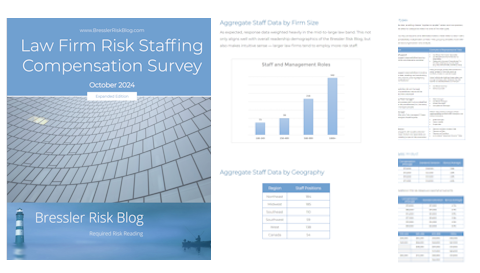BRB Risk Jobs Board — Conflicts Attorney (Fredrikson)
Posted onIn this BRB jobs update, I’m pleased to spotlight an open position at Fredrikson: “Conflicts Attorney” —
- We are seeking an experienced Conflicts Attorney to join our firm.
- This role is essential for ensuring the highest standards of legal and business conflict resolution. The Conflicts Attorney will work closely with the Ethics Counsel and members of the Office of the General Counsel to identify and resolve potential conflicts, conduct due diligence on new clients, and ensure compliance with firm policies.
- This is a hybrid work position.
Key Responsibilities Include
- Review new business conflict submissions for clarity and completeness.
- Analyze conflicts reports to identify potential conflicts, risk management issues, anti-money laundering concerns, and client relationship issues.
- Facilitate the resolution of complex former client and material limitation conflicts.
- Prepare detailed disclosure reports and communicate potential conflicts to requesting attorneys.
- Draft waivers and consents and advise on ethical issues related to withdrawal and screening.
- Negotiate with lawyers to resolve disputes over conflicts and waivers.
- Act as a legal advisor on conflicts of interest issues.
- Elevate significant conflicts to the Ethics Counsel as needed.
- Collaborate with Intapp consultants and stakeholders to improve the user experience and maintain database accuracy.
- Participate in vendor user groups and demonstrations to explore new processing methods and potential vendors.
Qualifications
- Juris Doctor degree and active bar license from at least one jurisdiction where Fredrikson operates.
- Minimum of 3 years of experience in conflicts/new business or law firm risk management, preferably at a mid to large-sized law firm.
- Thorough understanding of a wide range of areas of law, including being able to identify the roles of parties in matters, and possess a solid understanding of business organizations and financing concepts as well as litigation principles and procedures, such as depositions, subpoenas, roles of codefendants and comparative fault.
- Knowledge of the Rules of Professional Conduct and their application.
- Understanding of jurisdictional differences in legal principles and choice of law analysis.
- Proficiency in Intapp Open is strongly preferred.
- Ability work effectively in a hybrid environment.
- Strong analytical reasoning and research skills.
- Effectively cope with change; can decide and act without having the total picture.
- Excellent written and verbal communication skills.
- Strong organizational skills and attention to detail.
- Ability to work independently and exercise sound judgment.
- Collaborative, with a customer service-oriented approach.
Applying For This Position
Applications will only be accepted online at www.fredlaw.com/careers. Applicants will be asked to submit a cover letter, resume, and salary requirements. For assistance with the application process or for accommodations, please contact recruiting@fredlaw.com.
About Fredrikson
Diversity and inclusion are core values of Fredrikson & Byron. To best serve our clients, we provide innovative solutions to legal needs by cultivating a diverse workforce. With a reputation as the firm “where law and business meet,” our attorneys and staff bring business acumen and entrepreneurial thinking to operate as business advisors, strategic partners, and legal counselors to our clients. The firm’s 400+ attorneys serve clients through our ten locations around the world: Minneapolis, Saint Paul, and Mankato, MN; Bismarck and Fargo, ND; Ames and Des Moines, IA; Madison, WI; Saltillo, Mexico; and Shanghai, China. Visit www.fredlaw.com for more information.
See their careers site for more on the company and work environment, see the complete job posting for more details on the position and to apply.
And if you’re interested in seeing your firm’s listings here, please feel free to reach out…









 Now in its third year, the 2024 Law Firm Risk Staffing Compensation Survey report is fresh off the presses! (And also on file with the US Copyright Office.)
Now in its third year, the 2024 Law Firm Risk Staffing Compensation Survey report is fresh off the presses! (And also on file with the US Copyright Office.) 